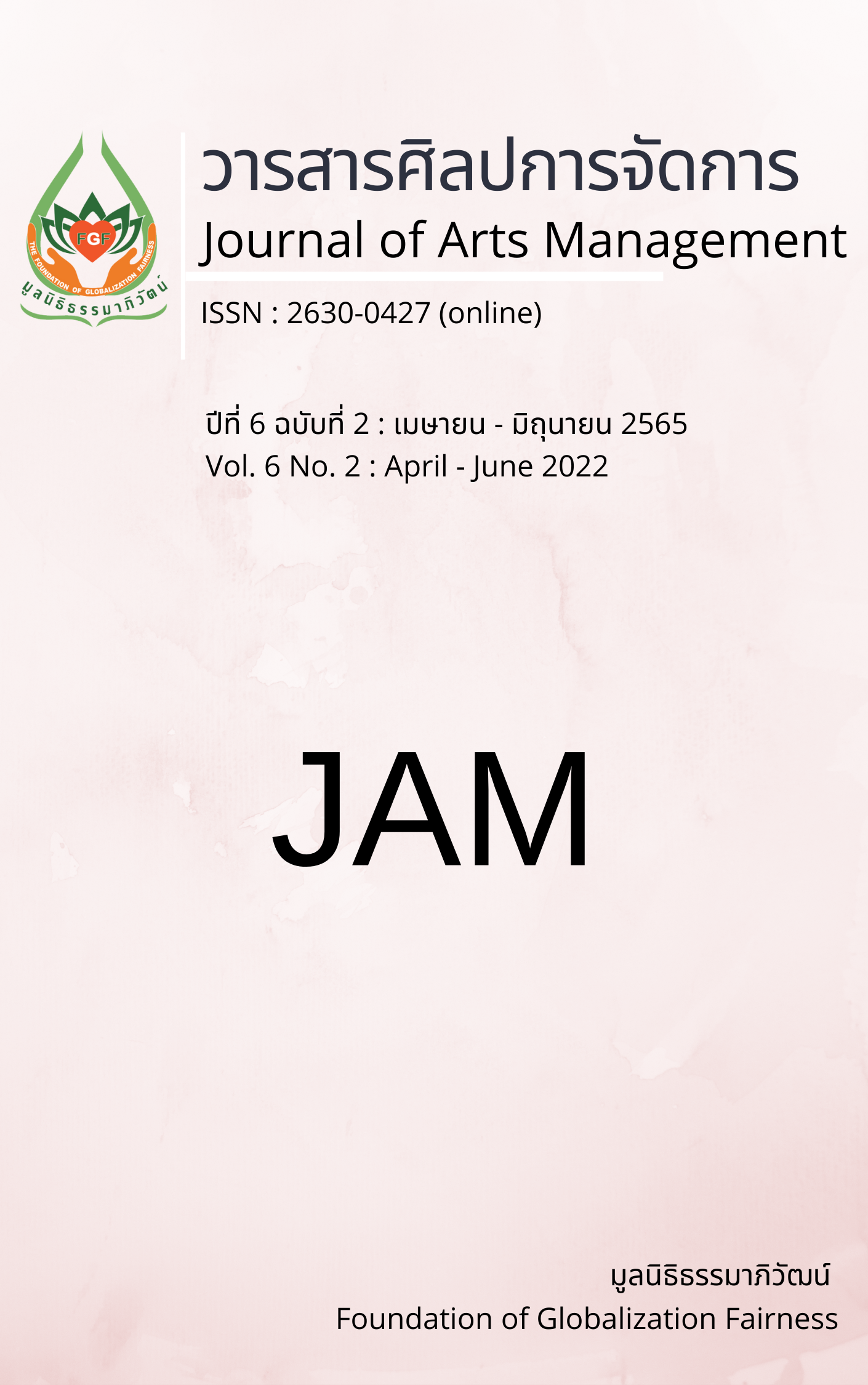Development of Performing Art Learning Model Based on Steam Education for Science School
Main Article Content
Abstract
This article aimed to study 1) the learning model for the Thai performing arts subject based on STEAM education to help develop a more comprehensive and universally accepted educational model and 2) the results of the learning model for the Thai performing arts subject based on STEAM education. This study was mixed method research, the population and sample consisted of Matthayom 6 students from Kamnoetvidya Science Academy School. The instruments for collecting data were documents, interviews, questionnaires, observations, and experiments. The statistics used in the data analysis were basic statistics, average, percentage, reliability, and standard deviation. The research results were found as follows:
1) STEAM is an integrated learning approach, which requires an intentional connection between science and the Thai performing arts. The contents of the Thai performing arts subjects were practice, history, aesthetics, and criticism. Those contents were incorporated into the STEAM process and created the six steps: identifying problems, locating components, discovering new ideas, developing new solutions, presenting them, receiving feedback, and improving or redesigning. The results of three experts' accuracy measurements were aligned with the research objectives, indicating that the tool was accurate. It's acceptable to use it.
2) The results of a learning model for the Thai performing arts subject based on STEAM education found that attitude had the highest average score. Skill attributes averaged a moderate score. Knowledge attributes received the lowest average score. But the standard deviation (S.D.) of the scores for each group was relatively low, meaning the distribution of scores was relatively low. All groups had similar measurements and evaluations.
Article Details

This work is licensed under a Creative Commons Attribution-NonCommercial-NoDerivatives 4.0 International License.
Views and opinions appearing in articles in the Journal of Arts of Management It is the responsibility of the author of the article. and does not constitute the view and responsibility of the editorial team I agree that the article is copyright of the Arts and Management Journal.
References
Dachakupt, P., & Yindeesuk, P. (2017). Learning management in 21st century. Chulalongkorn University.
Erba, M. D. (2019). Preparing students for learning, work and life through STEAM education. https://files.eric.ed.gov/fulltext/ED598088.pdf.
Henriksen, D. (2014). Full STEAM ahead: creativity in excellent STEM teaching practices. The STEAM Journal, 1(2), 1-6.
IAS Team. (2019). 6 steps to creating a STEAM classroom. https://artsintegration.com/2016/02/25/ 6-steps-to-creating-a-steam-centered-classroom/.
Khammani, T. (2017). A variety of methods for learning management. Wattana Panich.
Lubpailee, M. (2006). Introduction to smart children and children with special abilities. Chulalongkorn University.
Orapiriyakul, S. (2019). STEAM EDUCATION: innovative education integrated into learning management. Journal of Research and Curriculum Development, 9(1), 1-16.
Phonnong, I., & Keeratichamroen, W. (2021). developing instructional model based on STEAM education for enhancing creative thinking skill of students in small elementary schools. Ratchaphruek Journal, 19(3), 19-129.
Poomsoong, P., & Nuangchalerm, P. (2021). Development design thinking of Mathayomsuksa 4 students by using STEAM education. Journal of Educational Administration and Supervision Mahasarakham University, 12(3), 204-215.
Tavener, D. (2021). Prepared. Bookscape.
University of Findlay. (n.d.). Master of Arts in Education degree with an emphasis in STEAM instruction. https://www.findlay.edu/education/graduate-programs/mae-steam.
University of Pittsburgh. (n.d.). STEAM Certificate. https://pittprofessional.catalog.instructure.com /courses/steam-education.
University of San Diego. (n.d.). Specializations & Curriculum. https://onlinedegrees.sandiego.edu /masters-education/specializations.
Wagner, T. (2018). Creating Innovator. Bookscape.
Wang, L. H., Chen, B., Hwang, G. J., Guan, J. Q., & Wang, Y. Q. (2022). Effects of digital game-based STEM education on students’ learning achievement: A meta-analysis. International Journal of STEM Education, 9(26), https://doi.org/10.1186/s40594-022-00344-0.


